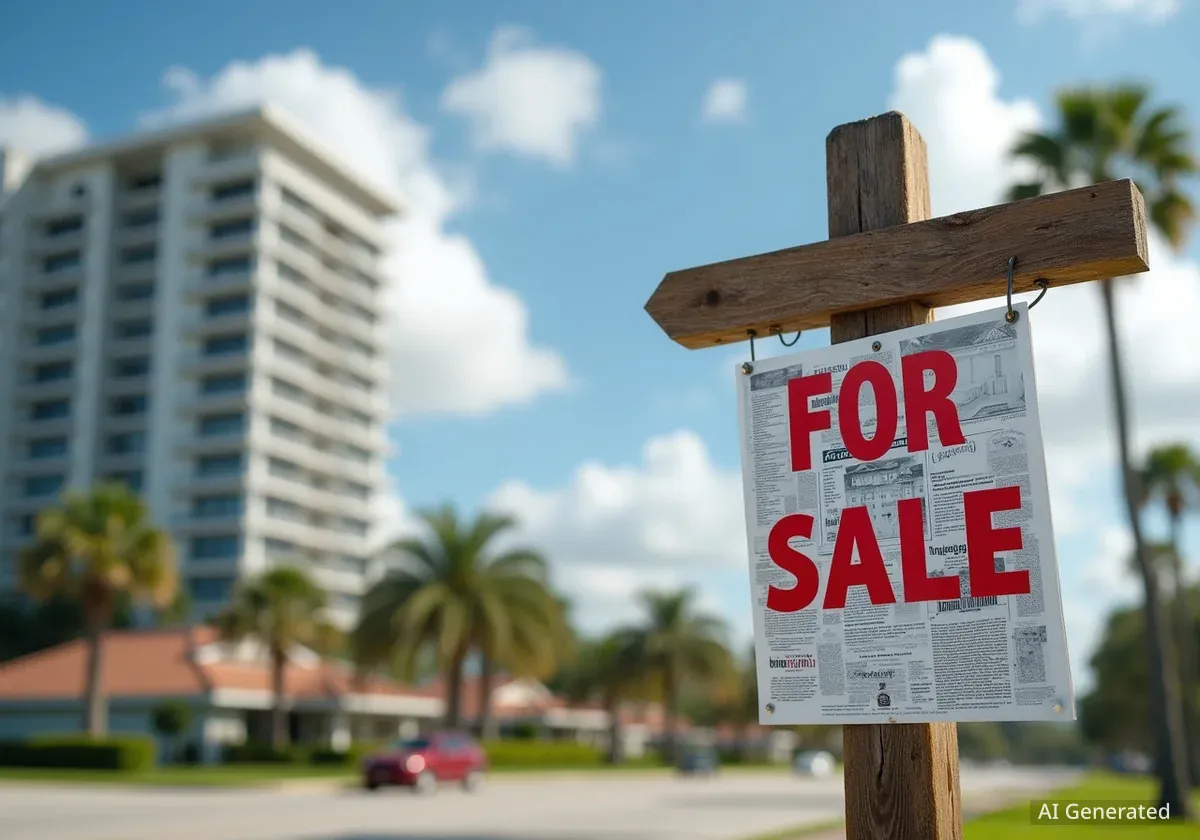Real estate professionals across Florida are adapting to a series of significant legal and regulatory updates that impact daily operations. The changes, detailed at the 2025 Florida Realtors Convention in Orlando, introduce new requirements for property disclosures, condominium sales, telemarketing practices, and ethical standards, alongside heightened warnings about sophisticated financial scams.
These new rules, several of which are already in effect or will be implemented soon, require agents and brokers to update their procedures to ensure compliance, protect their clients, and mitigate business risks. The adjustments span from revisions in the National Association of Realtors'® Code of Ethics to new state-level mandates on flood and condo disclosures.
Key Takeaways
- New Disclosure Rules: Sellers and landlords now face stricter requirements for disclosing flood risks, effective October 1, 2025.
- Condo Law Overhaul: Recent legislation mandates enhanced transparency for condo associations, including required websites and a buyer review period for documents.
- Ethical Standard Revisions: The National Association of Realtors® has updated 11 Standards of Practice in its Code of Ethics as of June 5, 2025.
- Heightened Cybersecurity Threats: Professionals are warned against a rise in complex scams, including wire fraud, cryptocurrency schemes, and AI-driven impersonations.
- Stricter Telemarketing Compliance: The Telephone Consumer Protection Act (TCPA) now enforces stricter consent rules for marketing calls and texts, with significant penalties for violations.
Navigating New Ethical Standards for Realtors
A primary area of change involves the ethical guidelines governing real estate professionals. The National Association of Realtors® (NAR) implemented significant revisions to its Code of Ethics and Arbitration Manual, which became effective on June 5, 2025. These updates were announced during the Realtors® Legislative Meetings earlier in the year.
The changes affect 11 specific Standards of Practice (SOPs), which provide detailed interpretations of the Code of Ethics. According to legal experts at the convention, some revisions were made to provide greater clarity on existing rules, while others are directly related to the recent NAR settlement agreement that has reshaped commission structures and agent responsibilities nationwide.
Affected Standards of Practice
The updated SOPs include: 1-12, 1-13, 1-16, 3-1, 3-2, 3-9, 9-2, 10-1, 10-5, 16-11, and 16-16. Professionals are advised to review these changes to ensure their business practices align with the latest national standards.
Florida Realtors attorneys emphasized that staying current with these ethical mandates is crucial for maintaining professional standing and avoiding disputes. The adjustments touch on aspects of advertising, cooperation with other brokers, and client communications.
Increased Urgency on Cybersecurity and Fraud Prevention
The real estate industry continues to be a prime target for increasingly sophisticated financial scams. Experts at the convention highlighted a growing number of threats that agents and their clients must guard against. These threats go beyond traditional phishing emails and have evolved with technology.
Prominent Security Threats
Among the most dangerous schemes are "pig-butchering" cryptocurrency scams, where criminals build trust over time before defrauding victims. Other major risks include fraudulent health insurance offers that falsely use the NAR's name, persistent wire and deed fraud attempts, and the use of artificial intelligence to create voice clones for impersonation scams.
"Brokers are being urged to provide regular cybersecurity training, verify all wire instructions through direct phone calls, and report suspicious activity immediately. Vigilance is no longer optional; it's an essential part of the business."
To combat these threats, professionals are advised to adopt multi-factor authentication, use secure communication channels, and educate clients on the risks. Reporting any suspicious activity is critical. Incidents should be reported to the FBI's Internet Crime Complaint Center (ic3.gov) and the Federal Trade Commission (reportfraud.ftc.gov).
Major Overhaul of Florida's Condominium Laws
Florida's condominium market is undergoing a significant transformation due to new legislation aimed at increasing transparency and buyer protection. These laws, referred to as "Condo 3.0" and "Condo 4.0," introduce new digital record-keeping and disclosure requirements.
Condo 3.0, which took effect on July 1, 2024, mandates that most condominium associations with 25 or more units must establish and maintain a secure website by January 1, 2026. These websites must provide residents and prospective buyers access to essential documents.
Required Online Documents
- Declarations and bylaws
- Annual budgets and financial reports
- Management contracts
- Structural integrity reserve studies and other inspection reports
Building on this, Condo 4.0 went into effect in July 2025. This law grants prospective buyers a seven-business-day window to review all the documents posted on the association's website. During this period, a buyer has the right to cancel their purchase agreement without penalty, ensuring they have sufficient time to make a fully informed decision about the property and the financial health of the association.
Stricter Flood Disclosure Requirements for Sellers and Landlords
Effective October 1, 2025, Florida will implement expanded flood disclosure rules for residential properties. This new law, signed in June 2025, builds upon the state's long-standing precedent set by Johnson v. Davis, which requires sellers to disclose hidden defects that materially affect a property's value.
The updated statute requires property sellers to provide a specific flood disclosure form to buyers. This requirement also extends to landlords who are leasing property for a term of one year or more, who must give a similar notice to their tenants. The law may also apply to the sale of vacant land that is intended for residential construction.
While the law does not specify automatic penalties, non-compliance carries significant risk. A seller who fails to disclose known flood risks could be held liable for damages if the property floods after the sale. Similarly, a tenant who suffers substantial property loss due to a landlord's failure to disclose may have grounds to terminate their lease agreement. Real estate agents play a key role in ensuring their clients understand and fulfill these disclosure obligations.
Navigating New Telemarketing Compliance Rules
Real estate firms engaging in telemarketing are facing new challenges under the Telephone Consumer Protection Act (TCPA). Recent Federal Communications Commission (FCC) regulations have created a stricter environment for making marketing calls, sending texts, and using robocalls.
The core requirement is that businesses must obtain prior written express consent before initiating autodialed or prerecorded communications. This consent must be clear and unambiguous.
Key TCPA Compliance Actions
- Obtain Written Consent: Secure explicit, written permission from consumers before adding them to automated call or text lists.
- Honor Stop Requests: Immediately cease communication upon receiving a "stop" request from a consumer.
- Scrub Calling Lists: Regularly check numbers against the National Do-Not-Call Registry, the Florida Do-Not-Call list, and the FCC's Reassigned Numbers Database to avoid contacting individuals who have opted out or numbers that have changed ownership.
The financial consequences of violating these rules are severe. Fines can range from $500 to $1,500 per individual call or message that is found to be non-compliant. This makes careful adherence to TCPA guidelines essential for any real estate business that uses telemarketing for lead generation or client outreach. Florida Realtors' legal experts advise consulting with legal counsel to ensure marketing practices are fully compliant.





